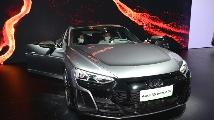CHANGCHUN, Feb. 26 (Xinhua) -- Sascha Schuerrer and his wife, Johanna Garzon-Schuerrer, both engineers from Germany, joyfully celebrated the traditional Lantern Festival with their daughter Julia in Changchun, capital of northeast China's Jilin Province.
Seven months ago, they moved from Ingolstadt, hometown of German auto giant Audi, to Changchun, which is regarded as the cradle of China's auto industry.
The couple both work for Audi FAW NEV Co., Ltd., which is stepping up construction at its site in Changchun, Audi's first production base for purely electric vehicles in China. On Jan. 26, the German luxury carmaker launched pre-mass production at the base, an important step for the company in further optimizing its strategic layout in China's new energy vehicle (NEV) market.
The German family is fond of Changchun -- a big city in their eyes, with numerous houses, bustling traffic and diverse activities -- and has fully engaged in local customs and festivities. "We went skiing and visited Changchun Ice and Snow New World. The snow there is good, very soft," Johanna said.
What delighted them most is the convenience of life there. Almost everything can be accomplished using their phones. They truly appreciated this technological lifestyle.
Currently, over 200 foreign experts, like Sascha and Johanna, have come to Changchun from around the world to strengthen the Sino-German automotive collaboration.
The company provides them with high-standard offices and advanced equipment. The local government has built an ecological community for the talent, offering them comfortable living conditions.
China is now leveraging its early advantages in NEVs to gain technological, industrial and collaborative strengths. Global automotive giants, such as Volkswagen, Audi, BMW and Mercedes-Benz, are intensifying their presence and electrification efforts in China to capture a larger market share.
Data from the China Association of Automobile Manufacturers shows that in 2023, the production and sales of NEVs in China exceeded 9.58 million and 9.49 million units, respectively, ranking first globally for nine consecutive years.
"We see that the NEV market is really increasing every year, especially in China. And that, of course, is also why we are here, because Audi wants to participate and bring new NEV models to the market here," Sascha said.
As a delivery manager, Sascha has learned new processes and technologies through cooperation in China. Recently, he explored eco-friendly techniques in the paint shop, a novel experience for him. "It's fascinating to witness the rapid development in this field in China," Sascha said.
Helmut Stettner, chief executive officer of Audi FAW NEV Co., Ltd., said the base boasts a planned annual production capacity of over 150,000 vehicles. Three pure electric models tailored for the Chinese market are expected to roll off its production lines by the end of this year and hit the market in early 2025.
Sascha emphasized the significance of the newly formed company as a key milestone in Sino-German collaboration in the NEV sector. He highlighted the substantial support from both international experts and local colleagues, which will bring essential economic benefits to Changchun and its neighboring regions.
Sascha and Johanna said they cherish the opportunity to work in China and plan to live and work here for a while longer. "I am eager to explore the diverse and fascinating culture in China while witnessing its rapid development," Sascha added.




 A single purchase
A single purchase









